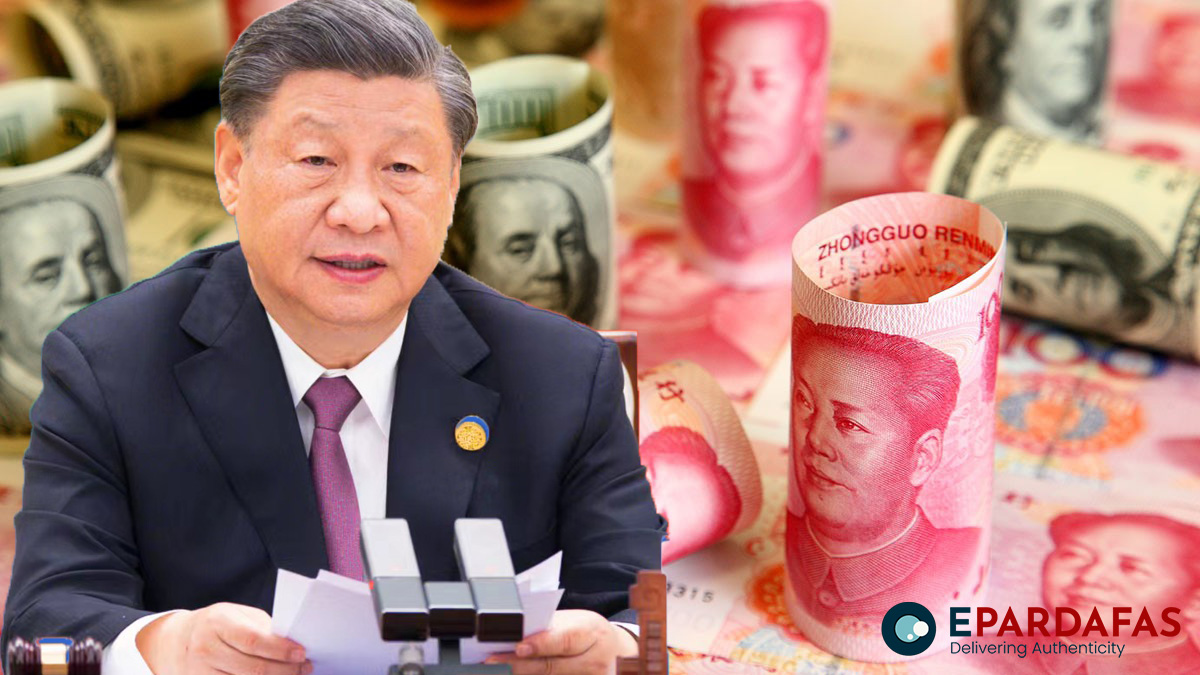
China Targets 3% GDP Budget Gap in 2024, Considers Special Debt Issuance for Economic Stimulus
Chinese leaders concluded an annual economic meeting this week, agreeing to maintain fiscal discipline with a budget deficit target of 3% of gross domestic product (GDP) in 2024, according to three anonymous sources familiar with the matter. While lower than this year’s revised 3.8% target, the decision suggests a measured approach to fiscal policies.
The Chinese government appears poised to utilize off-budget debt, including the issuance of special sovereign bonds, to provide additional fiscal support for the economy. These bonds, as one source mentioned, could amount to 1 trillion yuan ($140.16 billion). The flexibility offered by off-budget sovereign debt allows Beijing to adjust stimulus measures dynamically to ensure stable economic growth.
Special sovereign bonds have been employed by China in the past for specific purposes. In 2020, 1 trillion yuan was issued to fund COVID-related measures, and similar bonds were utilized in 2007 and 1998 for other financial initiatives. China views these bonds as extraordinary measures for specific projects or policy goals in times of need, not included in annual budget plans, Reuters Reported.
The Chinese State Council Information Office, the finance ministry, and the National Development and Reform Commission did not immediately respond to Reuters’ requests for comment.
Additionally, local governments may see an increase in their bond quota, with an estimated 4 trillion yuan in 2024 compared to 3.8 trillion yuan in the current year, according to one source.
The Central Economic Work Conference, held behind closed doors on Monday and Tuesday, resulted in leaders endorsing a proactive fiscal policy for 2024. The government aims to implement a new round of fiscal and tax reforms while improving the structure of fiscal spending to support strategic objectives.
While specific growth targets are usually disclosed during China’s annual parliament meeting in March, government advisers have indicated a range of 4.5% to 5.5% for 2024, with a majority favoring a target around 5%. This aligns with the current year’s target.
Investors are closely monitoring China’s fiscal position, particularly after a recent downgrade warning from Moody’s, citing concerns about the costs associated with local government and state firm bailouts and efforts to manage the property crisis.
China’s local government debt has risen to 92 trillion yuan, constituting 76% of the country’s economic output in 2022, up from 62.2% in 2019, according to International Monetary Fund data.
As the Chinese government aims for steady economic growth, analysts anticipate maintaining flexibility around the budget deficit in 2024, given uncertainties in the economic landscape. The government’s commitment to a flexible, moderate, precise, and effective fiscal policy was reiterated by the Politburo, the top decision-making body of the Communist Party.
Chinese leaders concluded an annual economic meeting this week, agreeing to maintain fiscal discipline with a budget deficit target of 3% of gross domestic product (GDP) in 2024, according to three anonymous sources familiar with the matter. While lower than this year’s revised 3.8% target, the decision suggests a measured approach to fiscal policies.
The Chinese government appears poised to utilize off-budget debt, including the issuance of special sovereign bonds, to provide additional fiscal support for the economy. These bonds, as one source mentioned, could amount to 1 trillion yuan ($140.16 billion). The flexibility offered by off-budget sovereign debt allows Beijing to adjust stimulus measures dynamically to ensure stable economic growth.
Special sovereign bonds have been employed by China in the past for specific purposes. In 2020, 1 trillion yuan was issued to fund COVID-related measures, and similar bonds were utilized in 2007 and 1998 for other financial initiatives. China views these bonds as extraordinary measures for specific projects or policy goals in times of need, not included in annual budget plans.
The Chinese State Council Information Office, the finance ministry, and the National Development and Reform Commission did not immediately respond to Reuters’ requests for comment.
Additionally, local governments may see an increase in their bond quota, with an estimated 4 trillion yuan in 2024 compared to 3.8 trillion yuan in the current year, according to one source.
The Central Economic Work Conference, held behind closed doors on Monday and Tuesday, resulted in leaders endorsing a proactive fiscal policy for 2024. The government aims to implement a new round of fiscal and tax reforms while improving the structure of fiscal spending to support strategic objectives.
While specific growth targets are usually disclosed during China’s annual parliament meeting in March, government advisers have indicated a range of 4.5% to 5.5% for 2024, with a majority favoring a target around 5%. This aligns with the current year’s target.
Investors are closely monitoring China’s fiscal position, particularly after a recent downgrade warning from Moody’s, citing concerns about the costs associated with local government and state firm bailouts and efforts to manage the property crisis.
China’s local government debt has risen to 92 trillion yuan, constituting 76% of the country’s economic output in 2022, up from 62.2% in 2019, according to International Monetary Fund data.
As the Chinese government aims for steady economic growth, analysts anticipate maintaining flexibility around the budget deficit in 2024, given uncertainties in the economic landscape. The government’s commitment to a flexible, moderate, precise, and effective fiscal policy was reiterated by the Politburo, the top decision-making body of the Communist Party.













Comments